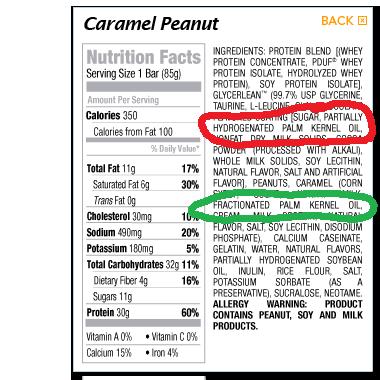Mailbag: Fractionated vs hydrogenated oils
Dear AllStarHealth,
We’re trying to avoid hydrogenated oils, which I understand are bad for your heart. I’ve noticed that the bars we buy have something called ‘fractionated’ oils. That doesn’t sound good! What are they and are they as bad for you as hydrogenated oils?
Thanks,
Del Garza
Bend, OR
Dear Del,
Fractionated oils are totally different than hydrogenated oils and don’t pose the health risks associated with hydrogenated oils, which as you point out, relate mainly to the cardiovascular system.
Both fractionation and hydrogenation are ways of processing an oil to change the consistency and melting point. You ‘saturate’ the fat molecules of a liquid oil with hydrogen atoms, which makes it thicker, more solid, and raises its melting point. From a manufacturer’s standpoint, that’s a good thing since it makes an oil easier to handle, easier to bake with and extends its shelf-life. Crisco was one of the first hydrogenated food oils. But health-wise, no, hydrogenated oils aren’t good for you in any amount, that’s true. The exact reasons are not clear. Depending on the oil used, hydrogenated oils may contain trans-fats, not the cis-fats in most edible oils. Trans and cis refer to the shape of the molecule. They’re made of the same substructures, but oriented differently. One theory is that the human lipase enzyme, which we use to break down and digest fat, is specific for cis-fats. That means it would take trans-fats much longer to be cleared from the bloodstream and body, increasing the likelihood that it will be deposited on vessel walls much like oxidized cholesterol.
In any event, many people are trying to avoid hydrogenated oils now, having come to that position independently or on the advice of their doctor.
Fractionated oils are different. The term comes from the fact that most edible oils contain a mixture of saturated and unsaturated fats, a ‘fraction’ of each. The more saturated a fat an oil contains, the more solid that oil becomes, and the higher its melting point, and vice-versa. Fractionation can make an oil either more liquid or more solid, by removing either the saturated or the unsaturated fractions. Since the basic molecular structure of the fats aren’t changing – only their proportions – fractionated oils don’t pose any of the drawbacks specific to hydrogenated oils.
Note: Labeling laws allow a product with any amount less than .5 g of trans-fat to claim zero grams of tran-fat. That’s how and why some product’s have a front label that says “Zero Trans Fat” while the Nutrition Facts panel shows hydrogenated oil.




